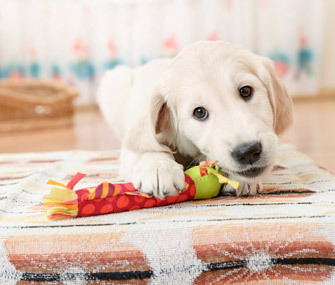Tips to Create a Safe Home for Your Rambunctious Puppy
Published on September 18, 2015
Skip To

Not so fast! Your puppy may be at risk in other ways, including sliding on slick floors, running into walls, falling down stairs and jumping off furniture. His musculoskeletal system is still developing, and there can be a fine line between ensuring that he grows strong bones and muscles, and avoiding broken bones and orthopedic problems. Here are some tips for encouraging your puppy to play, explore and learn — without getting hurt.
Put a Stop to Skids and Tumbles
Puppies scramble through the house like
they’re on the track at the Puptona 500, sliding across slick floors and
careening into walls. It looks like fun, but it’s not great for their joints. Until his ligaments mature, slow your pup down a bit and give him some
traction and a softer landing with nonskid throw rugs or rubber-backed mats over
wood, tile or other slippery flooring, especially in high-traffic areas and
entryways. Play ball or other chase or fetch games outdoors on grass instead of indoors on slick floors. This can help protect him from sacroiliac strain, cruciate tears and complications from shoulder instability or hip problems (and help protect
your wallet from a $5,000 or $6,000 surgical repair bill). Your dog also needs to learn to use the stairs, of course, especially if he’s a giant breed, such as a Mastiff or Scottish Deerhound — you can’t carry those breeds around! But puppies and stairs can be a dangerous combination, no matter the breed. A tumble down the stairs can end in a knee, back or neck injury, or even broken bones, so support and guide your pup as he goes downstairs. This helps him learn to move at a measured pace instead of throwing himself down Helter Skelter. You can also put your pup on leash and walk him up and down the stairs. Attach the leash to a halter instead of the collar for more stability and control.
Hardwood and tile stairs are hazardous. For greatest safety, shell out the money for a runner installed by a professional carpet layer. Open riser stairs can also be risky for a pup: If his leg slips through the space under the tread, it could be broken in the struggle to regain his footing. No matter what kind of staircase you have, put baby gates at the top and bottom of the stairs to make sure your pup can’t access them on his own or when you aren’t there to supervise.
Keep Puppy Feet on the Floor
Puppies seem to think they have wings, as they fearlessly leap off chairs, sofas and beds. But splatting onto the floor, especially if there’s no carpet or nonskid rug to cushion their landings, is the fast lane to knee injuries, broken bones or slipped discs. Be especially cautious with tiny dogs or dogs with long backs, such as Dachshunds, Basset Hounds or Corgis. Encourage safe access off furniture or out of vehicles with pet steps or ramps. You could also provide an ottoman or footstool as a sort of stepping stone from the bed or sofa to the floor. Place a throw rug in front of furniture to help ensure a safe landing. Teach pups to wait to be lifted off beds or out of cars. I guarantee you, it’s a lesson they’ll remember and benefit from throughout their lives.When your puppy isn’t jumping off things, he may be climbing up on them. Dogs are ingenious when it comes to getting at food or garbage, for instance. The tall ones will simply stand on their hind legs and counter surf, but I’ve known plenty of shorter dogs who have made use of chairs or other objects to access a resting roast. Countering counter surfing is primarily a matter of placing items out of reach. If you think your dog can’t get to something, be smart and place it farther back or higher up — just to make sure. Push chairs under tables and away from counters to reduce the risk that your dog will get the bright idea to climb on them to get where he wants to go.
Best of all, teach “leave it” or “off” commands from an early age. Some dogs are intransigent, but others really will learn to obey you — even when food is in play.
More on Vetstreet:
- Puppy Basics 101
- Popular Names for Top 10 Small Dog Breeds
- Everyday Items That Are Dangerous to Pets
- 5 Smartest Dog Breeds, Chosen by Veterinary Professionals
- How Your Dog’s Tricks Can Help in Real-Life Situations

